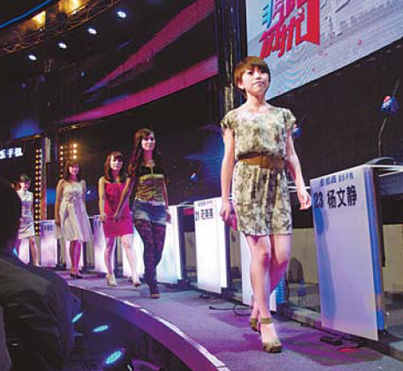Playing by the rules in the game of love
Fans of the popular dating show If You Are the One (Fei Cheng Wu Rao) will have noticed some big changes in the format when it aired last weekend.
 |
|
Female contestants appear on the popular dating show If you are the one, produced by Jiangsu TV, late last month. |
Gone were the usual barbs from female contestants aimed at the men attempting to win their affection. There was also far less talk about people's wealth and family background.
Instead, the hosts highlighted the contestants' volunteer work and positive attitudes toward life and love. Producers at Jiangsu TV, which broadcasts the show by satellite, also introduced a counselor named Huang Han, a psychology professor at the provincial Party school, to give relationship advice.
Although a huge departure for a show known for its controversial and at times confrontational style, the changes came as little surprise following the notice last month from the State Administration of Radio, Film and Television (SARFT) that banned "fake participants, morally provoking hosts and comments that allude to sex" in television dating shows.
The new rules sent shockwaves through the industry. Producers at Zhejiang TV even opted to cancel their matchmaking show, Run For Love (Wei Ai Xiang Qian Chong), which aired for the last time on June 15.
Liu Yuan, marketing director of the editor's office at Jiangsu TV, refused to talk about the changes when contacted by China Daily and would not reveal any future plans for the show.
Some media analysts and viewers hailed the changes as a "positive step" in dealing with a growing trend of sensationalism on television, with channels cranking up the controversy in the chase for ratings and better advertising revenue.
"The (recent) episodes of If You Are the One prove that dating shows can be entertaining and mainstream at the same time," said Zheng Baowei, director of Renmin University of China's research center of journalism and social development.
However, the mood among the Chinese blogosphere seems to be largely one of disappointment, with some arguing that the move has resulted in the shows losing their allure.
"I didn't like the episodes (on Saturday and Sunday)," reads one of the many comments left by netizens on Baidu Post, a popular Internet forum. "The girls are not as stylish or good-looking as before, and the comments are not as sharp. It has become a little boring."
Since If You Are the One and Hunan TV's Take Me Out (Wo Men Yuehui Ba) hit the airwaves in January this year, they have raked in fans by the millions and swept the prime-time ratings.
According to Beijing-based CSM Media Research, the audience share for If You Are the One increased from about 1 percent in its first month to a peak of 4.2 percent in May. The average share for the first 22 episodes was 2.3 percent.
"For the average television program in China, getting just a 1-percent audience share is already pretty good," said professor Hu Zhifeng at Communication University of China.
With high ratings comes high advertising revenue and Jiangsu TV hiked the cost of 15-second commercial spots during the show by 50 percent in May to 115,500 yuan (US$17,000).
The success, say analysts, was mainly due to a combination of highly attractive female contestants and the blunt, sometimes offensive comments they make.
Qian Wei, 26, who works in the media, said she is an avid viewer of dating shows but used to prefer If You Are the One for its flashpoints. "The rules are almost the same (for all of the shows) but it is the conflicts that make it exciting," she said. "After all, such blunt confrontation between men and women is rare on television, and even in real life.
The format is simple. In every episode of If You Are the One, a panel of 24 women "looking for love" grills a man on his life and aspirations. If a woman likes him, they get to go on a date. Although slightly different, each matchmaking show follows the same theme.
However, as many questions before the SARFT ban were about a man's wealth and family background, contestants have been regularly dubbed "materialist gold diggers" by Chinese media commentators and netizens.
Ma Nuo, a 22-year-old Beijing model, was accused in the press of being "vicious" and "money-driven" after she said during one episode that she "would rather weep in a BMW" than take a romantic spin on the back of one contestant's bicycle.
 0
0 







Go to Forum >>0 Comments